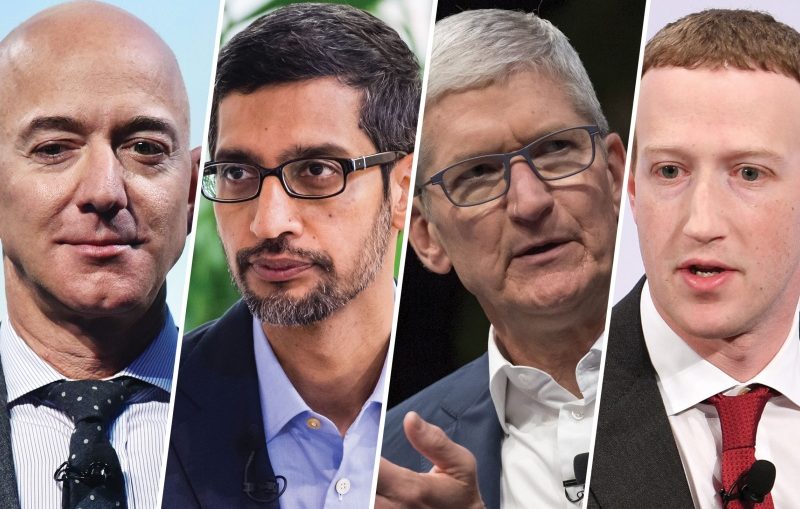With echoes of the trustbusting of U.S. Steel and Standard Oil more than a century ago and AT&T in 1984,
此次聽證會不禁讓人回想起一個多世紀前美國鋼鐵和標準石油公司以及1984年AT&T受到反壟斷調查時的情形,
the hearing underlined the government's recognition that this cohort of tech companies —
此次聽證會也凸顯了政府已經認識到,這群科技公司——
which wield immense control over commerce, communications and public discourse —
他們對美國的商業、通信和公共言論都擁有著巨大的控制權——
had become the new trusts of the internet age.
早已成為互聯網時代的托拉斯。
President Trump also used the event to rail against tech power.
特朗普總統還企圖利用此次聽證會將科技巨頭們痛斥一番。
In a post on Twitter before the hearing began,
聽證會開始前他就在推特上發帖稱,
he said that he would issue executive orders to rein in the companies if Congress did not.
如果國會沒能控制住他們,他也會頒布行政令控制他們。
From its conception, the House antitrust hearing was set to be a spectacle, lining up four of the world's most powerful executives —
從構想開始,眾議院這次舉行的反壟斷聽證會的場面就必然十分壯觀,因為全世界最有權勢的四位高管——
with two of them among the planet's richest individuals —to answer largely hostile questions together.
其中兩人還是全世界首屈一指的富豪——都被召集到了一起,回答各種充滿敵意的問題。
While the joint appearance limited sustained questioning of any one executive,
盡管四人的同時露面限制了對他們中間的任何一員進行長時間盤問的機會,
it created a side-by-side image that recalled the 1994 congressional hearing of top American tobacco executives,
但此次聽證會還是給了人一種似曾相識之感,不僅讓人想起1994年國會召集美國煙草高管舉行聽證會時的場面,
who said they did not believe that cigarettes were addictive.
那次聽證會上,高管們紛紛表示,他們并不認為香煙會讓人上癮。
House lawmakers, who had opened an investigation into the tech companies in June 2019, made the most of it.
眾議院議員,他們于2019年6月開始了對這些科技公司的調查,可謂充分利用了這一點。
Representative Jerry Nadler, Democrat of New York, confronted Mr. Zuckerberg with the C.E.O.'s own emails,
紐約州民主黨眾議員杰里·納德勒以扎克伯格自己的電子郵件為據向這位CEO發起了對峙,

saying they showed a plot to take out a young competitor.
稱那些郵件表明他正陰謀消滅一個年輕的競爭對手。
Representative Jim Jordan, Republican of Ohio, said Google was biased
俄亥俄州共和黨眾議員吉姆·喬丹表示谷歌存在偏見,
and asked Mr. Pichai whether the company would change its products to help elect Joseph R. Biden for president.
他質問皮查伊,谷歌是否會對其產品做出調整,以幫助約瑟夫·R·拜登競選總統。
In one of the sharpest exchanges, Representative Pramila Jayapal, a Washington Democrat,
最激烈的交鋒時刻之一便是華盛頓民主黨眾議員普拉米拉·賈亞帕爾與貝佐斯對質的時刻,
confronted Mr. Bezos on accusations that an Amazon lawyer had lied to the committee about how the company develops its own products.
她指控亞馬遜的一名律師在公司如何開發產品問題上對委員會撒了謊。
She asked him to answer whether it misused data with a yes or no.
她要求他回答亞馬遜是否存在濫用數據問題,他只需回答有或沒有。
"I can't answer that question yes or no," said Mr. Bezos, appearing rattled.
“這個問題我沒辦法回答有或沒有,”貝佐斯,面露慌色地,說道。
Yet while the hearing was ripe with theater,
然而,盡管聽證會充滿了戲劇性的時刻,
any impact will be limited by antitrust laws that were created a century ago and that are imperfect for corralling internet firms.
約束所有操作的是一個世紀前制定的反壟斷法,要論圍堵互聯網公司,這些法律還算不上天衣無縫。
Since the 1980s, enforcement officials have used the notion of consumer welfare as the predominant test for antitrust violations —
自20世紀80年代以來,執法官員一直拿“消費者福利”這一概念作為反壟斷違規行為的主要檢驗標準——
generally meaning that if prices are not going up, the markets are most likely competitive enough.
一般來說,這就意味著如果價格沒有上漲,市場競爭很有可能十分激烈。
The tech giants have generally not driven up prices of digital services or consumer goods;
事實上,科技巨頭們通常都沒有抬高數字服務或消費品的價格;
many do not charge at all for services like Google Maps or Instagram.
他們中間有很多甚至都是免費提供服務的,比如谷歌地圖,Instagram。
譯文由可可原創,僅供學習交流使用,未經許可請勿轉載。












